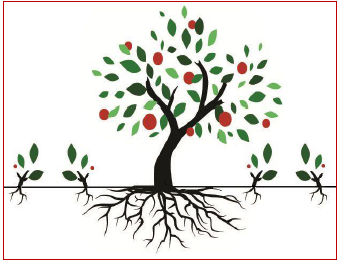
By F. Luis Casasus, General Superior of idente missionaries
Commentary on the Solemnity of The Most Holy Trinity, May 27, 2018, New York. (Book of Deuteronomy 4:32-34.39-40; Letter to the Romans 8:14-17; Matthew 28:16-20)
1. They worshiped, but they doubted. We can easily identify with the first Christians and their difficulty in believing in the resurrection. They doubted a lot; they did not believe in the resurrection of Jesus.
We can resist believing for many reasons. Maybe we hesitate because our intellectual convictions are threatened:
* Bertrand Russell was giving a public lecture, defending his atheism. A woman stood up at the end of the lecture and asked: Lord Russell, what will you say when you stand in front of the throne of God on judgment day? Russell replied: I will say: ‘I’m terribly sorry, but you didn’t give us enough evidence. He was not prepared to abandon his peculiar positions as an analytic philosopher.
At times, we prefer not believing because we see that some form of our power, reputation or social status is endangered:
* When Jesus raised Lazarus from the dead there were different responses from those who saw this once in a lifetime miracle: Therefore, many of the Jews who had come to visit Mary, and had seen what Jesus did, believed in him. But some of them went to the Pharisees and told them what Jesus had done. Then the chief priests and the Pharisees called a meeting of the Sanhedrin…. “Here is this man performing many signs. If we let him go on like this, everyone will believe in him”.
On other occasions, we refuse to believe because responsibility comes with believing:
* One night a house caught fire and a young boy was forced to flee to the roof. The father stood on the ground below with outstretched arms, calling to his son: Jump! I’ll catch you. He knew the boy had to jump to save his life. All the boy could see, however, was flame, smoke, and blackness. As can be imagined, he was afraid to leave the roof. His father kept yelling: Jump! I will catch you. But the boy protested: Daddy, I can’t see you. The father replied: But I can see you and that’s all that matters. This example describes in some way our ungenerous lack of faith in divine providence, in his mercy.
Sometimes we of think that the truth of the Gospel can be conclusively settled (for ourselves and others) either by bomb-proof arguments or by some spectacular miracle. It is true that providing people reasons to believe in God (Apologetics) can help. It is also true that when God does a miracle in front of your own eyes it can open them. But the gift of faith has to be accepted. The receptive action of the human being is a necessary condition. Sometimes we believe, but in other cases we harden our hearts to the evidence of God’s work in our presence.
In any case, Faith is not a mental exercise or a belief system that reason builds. And faith is not the same as belief. Remember that St. James writes in his Epistle that the demons believe and tremble, but this belief does not lead to salvation because it is not faith. Furthermore, our faith in God is not limited to acknowledge that God exists, rather faith is a response to hearing. God communicates His thoughts through His Word. When He enables us to hear what He is saying to us by the Spirit, this would create within us the response of being persuaded that what He is saying is indeed true and is for us. Faith comes by hearing, and hearing by the word of God (Rom 10:17). We read in the Acts about Philip baptizing the Ethiopian eunuch. As Philip and the eunuch were going along the road talking about the Word; they came upon water, and the eunuch said: Look, water. What prevents me from being baptized? Philip answered: If you believe from all your heart, you will be saved. And he was baptized. Our Father Founder says: The existence of God has only one proof: yourself (Transfiguration). We are not urged to try to get a deeper intellectual grasp of God, but rather as Moses instructed the people, think about what God has done for you.
In today’s First Reading we are invited to ask ourselves: Did a people ever hear the voice of God speaking from the midst of fire, as you did, and live? The sign of faith in a person are miracles, first class miracles, that is the conversion of souls or, at least, our own soul. These miracles are continuously occurring and the eyes of faith can see them, confirming the words of Jesus in today’s Gospel: All power in heaven and on earth has been given to me …And behold, I am with you always, until the end of the age. Who gives this power to Jesus? Our Heavenly Father. How the continuous presence of Jesus is manifested? Through the Holy Spirit. This is our experience of the Most Holy Trinity. What faith teaches us is…how to move mountains. This is God’s response to a mature faith that is expressed in clear, convinced and courageous personal choices. 2. The Sign of the Cross. Every time we make the sign of the cross, we do so in the name of the Trinity. The words “in the Name” instead of “in the names” express the fundamental truth of the trinity of God; God is one and God is a family.
The Sign of the Cross is an appeal to heaven made in the Name of Him who in submission to the will of His Father, humbled Himself and became obedient unto death, even death on a cross (Phil. 2:8). To say with this sign that we also would be willing to die for Him is a way of saying that we want to do everything in His name, on His behalf, in His own way: thoughts, desires, actions and plans…Is it true? This is the Spirit of the Gospel. This is why the sign of the cross is a powerful statement, a demanding and compromising prayer: In so doing, we place our life on the line. Particularly, each time we make the sign we should be reminded of our baptism. Our consciousness of the Trinitarian presence truly grows bigger every day. The strongest proof that we are made in the image of the Trinity is this: love alone makes us happy because we live in a relationship, and we live to love and to be loved. Borrowing an analogy from biology, we could say that imprinted upon his “genome”, the human being bears a profound mark of the Trinity, of God as Love (Benedict XVI, June 7, 2009).
The Sign of the Cross reveals the mystery of the Holy Trinity in the Death of Jesus on the Cross. At the very beginning of the Mass summarizes all that is about to happen. We are united together because we share in the same faith. This is why the mass begins with the invocation of the name of the Holy Trinity. The gathering of Christians in prayer or in the apostolate is not a social or political gathering but of faith in Christ.
As the Gospel teaches us today, the Church by its very nature is missionary. We are called to bring others into communion with the Father through the Son in the Holy Spirit. This is why at the beginning of the mass, the celebrant greets us saying: The grace of our Lord Jesus Christ and the love of God and the fellowship of the Holy Spirit be with you all. A man was injured in an accident and lost his memory. He forgot every detail of his life: his name, his friends, even his family. It took him months to recover from his injuries. And during that time, he was tended to most faithfully by one particular nurse. At first, he only knew her as “nurse.” But he soon learned her name, and then her schedule, and then her personality. They often spent time together, just laughing and talking. One day, during one of these visits, the man’s memory returned, and he suddenly recognized the nurse. To their delight, he exclaimed: I remember you. You’re my wife! And of course, she was. In some ways, this story is like our relationship between us and the Three Persons of the Most Holy Trinity. God, through the Holy Spirit, is always caring for us faithfully. But sometimes we just think in terms of conscience or moral goodness or psychological processes…We miss the opportunity of a trinitary contact and dialogue with the Divine Persons.
3. Are you a Disciple or a Student? A student is simply interested in gaining the knowledge that his/her teacher has while a disciple seeks to try and become who their teacher is. When you went through grade school, you were simply there to receive
knowledge, not necessarily become like the teacher, although this occasionally occurs. Well, I should confess that I wanted to marry my schoolteacher, Gloria, when I was five years old (I was not the only suitor for her).
A spiritual master makes disciples, not students. Even the most outstanding scientists (with a few exceptions) make disciples: Bohr, Pasteur, Poincaré, Koch, Severo Ochoa, Freud, Maxwell…When someone commits to follow a master, they left everything and live their life with him. In fact, a disciple of Jesus becomes so much like Him that people would know who his Master is even when the two are not physically together.
-A student does not necessarily have to be transformed, a disciple does.
– A disciple shares in the fate of the Master: Those who followed Jesus, had to commit themselves to stay with him in temptations (Lk 22:28), and in persecution (Jn 15:20) and had to be willing to take up the cross and die with him.
– But, as His disciples, we also inherited a mission, the same mission of Jesus: We are children of God, and if children, then heirs, heirs of God and joint heirs with Christ (Second Reading).
We never stop being disciples. We need to underscore once again the importance of our spiritual discipleship; we cannot rely on our experience, good will or talents…and that would not make us happy. One day, after seeing many followers fall away, Jesus asked His disciples: You do not want to go away also, do you? He was asking them if they will remain as true disciples. Simon Peter gave an inspired answer: Lord, to whom shall we go? You have the words of eternal life.
Our strength as a community of disciples lies in living a life of unity not in spite but because of our diversity. Only if we are sustained by the Spirit, whom the Father sent to us through the Son, we may all be one, even as you, Father, are in me, and I in you, that they also may be in us, so that the world may believe that you have sent me.












